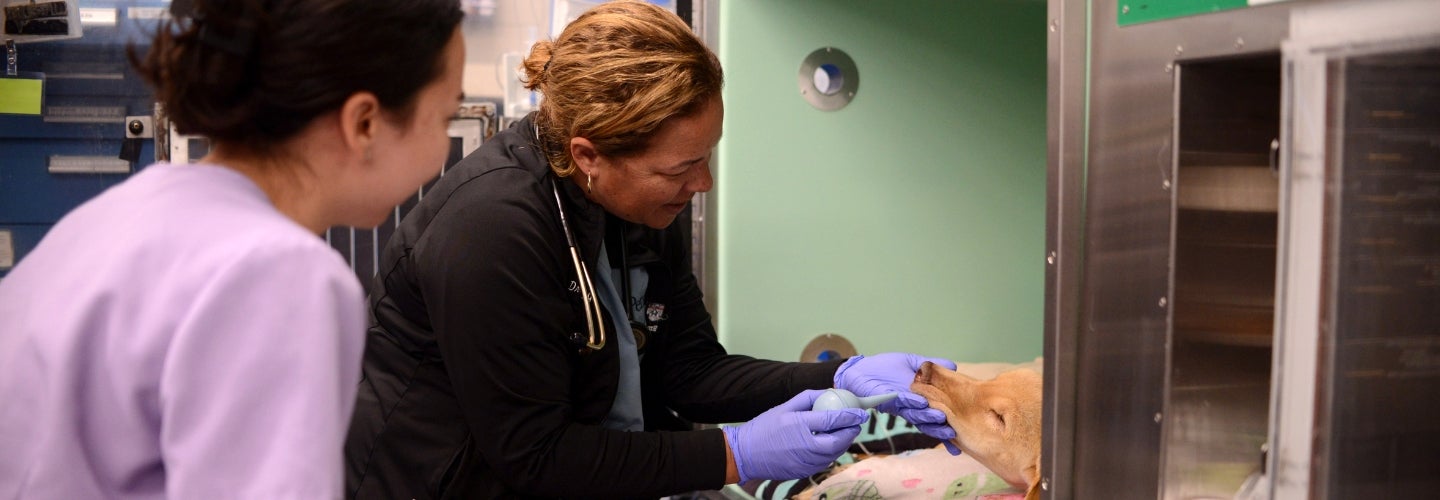
E&CC | Intensive Care Unit
What We do
As one of the area’s most experienced and well-established emergency services, we offer an unsurpassed level of care for pets that are the most critically ill small animal patients. Many patients are referred to us by other veterinarians who realize that these animals need specialized care, resources, and expertise for their survival. Our function is to provide this life-saving care throughout the day and night, seven days a week, 365 days per year.
Our world-renowned faculty and staff who support this service are pioneers in research on trauma, shock, and other emergency conditions and have written numerous publications in emergency and critical care medicine, guaranteeing that your pet’s most up-to-date treatments are provided.
Our Services
Symptoms, Diagnosis, and Treatment
The ICU service is available for animals who need a range of services that require continued care. Our ICU can care for up to 12 animals at a time. Our ICU veterinary technicians provide care for between one and three patients at any given time.
The average stay for a patient in ICU is 2-3 days, though it can range from a few hours to several weeks.
What types of cases are treated?
We commonly treat severe disease, kidney failure, complicated diabetes, advanced neurologic disease, animals with respiratory disease that require oxygen or other methods of breathing support, including mechanical ventilation, and cancer. Additionally, we provide specialized post-operative care for high-risk surgical and trauma patients. Each patient’s care and well-being is assessed constantly by the ICU team, with a low ratio of patients to staff most doctors and technicians only handle one to three patients at a time.
Why is your pet in the ICU?
The ICU has expertise and equipment not available elsewhere in our hospital. Admission to the ICU may be considered if your pet needs:
- Oxygen to help breathing
- A constant intravenous infusion of pain medications
- Intravenous nutrition
- Special monitoring and constant intravenous infusion of medicines for treatment of low blood pressure
- Constant ECG monitoring of the heart
- A ventilator to take over breathing
- A tracheostomy or chest tube
- Monitoring for seizures, following head injuries or any serious neurologic condition
- Post-operative monitoring for high-risk surgical procedures
- 24-hour monitoring and hour-to-hour adjustment of treatment protocol
Can you visit your pet in the ICU?
Your primary clinician at Ryan Hospital will update you at least 1-2 times a day, and you can arrange a time to visit your pet with them — typically during normal business hours. Visits may be limited in length due to the critical nature of our patients and caseload in the room.
Will my primary care veterinarian be updated?
We will update your primary vet upon admission and regularly throughout your pet’s stay. A copy of their discharge instructions will be sent to your veterinarian when your pet goes home.
Is there a veterinarian in the ICU all night long?
There is a veterinarian in the hospital at all times. Our ICU veterinary technicians are always in the ICU. The ICU residents and faculty are in the ICU 7 days a week, and are on call to provide patient care 24 hours a day. Whenever there is a critical patient in the ICU, a doctor from our team is in ICU 24 hours a day.
Our Care Team
Veterinarians
Section Chief, Emergency & Critical Care
Residents

Celeste Chen, DVM

Joseph Frame, DVM

Justin Hildebrand, DVM

Leanna Hoover, DVM

Allison O’Donnell, DVM

Sara Schatz, DVM

Erin Tack, DVM

Jordan Tarbutton, DVM

Brandon Weiss, DVM

Bridgette Zerbe, VMD
Amanda Arrowwood, CVT, VTS (ECC)
Torie Bonacci, CVT
Ila Charendoff, ICU Assistant
Ashley Deese, CVT
Carlos Garcia, CVT
Matthew Heft, CVT
Courtney Hill, CVT
Holly Killian, CVT
Alison Leigh, CVT
Lori Mansell, CVT
Ali Osorio, ICU/Wards/ES Floater Nurse
Mary Piccillo, CVT
Bekah Strazza, CVT
Matthew Strazza, CVT
Nicole A. Wood, CVT
Cara Yanussi, CVT
About the Section
Emergency, Critical Care, and Extracorporeal Therapy
The Emergency, Critical Care (ICU), and Extracorporeal Therapy services at Ryan Hospital work together to provide an unsurpassed level of care that ensures your pet has the best chance of recovery from life-threatening diseases or situations.
The veterinarians, residents, interns, and nursing staff work in a team-oriented environment to provide the best possible care. Explore each of these services below for more information.
Red Cross-First Aid App
Penn Vet’s Deborah Mandell helped to develop the American Red Cross Pet First Aid App and serves as their national spokesperson and pet safety advisor.
Be ready for any emergency. Download this app for your iPhone or Android device directly from the iTunes or Google Play app stores.
Ryan Veterinary Hospital
Emergencies:
(215) 746-8911
By Appointment:
(215) 746-8387








